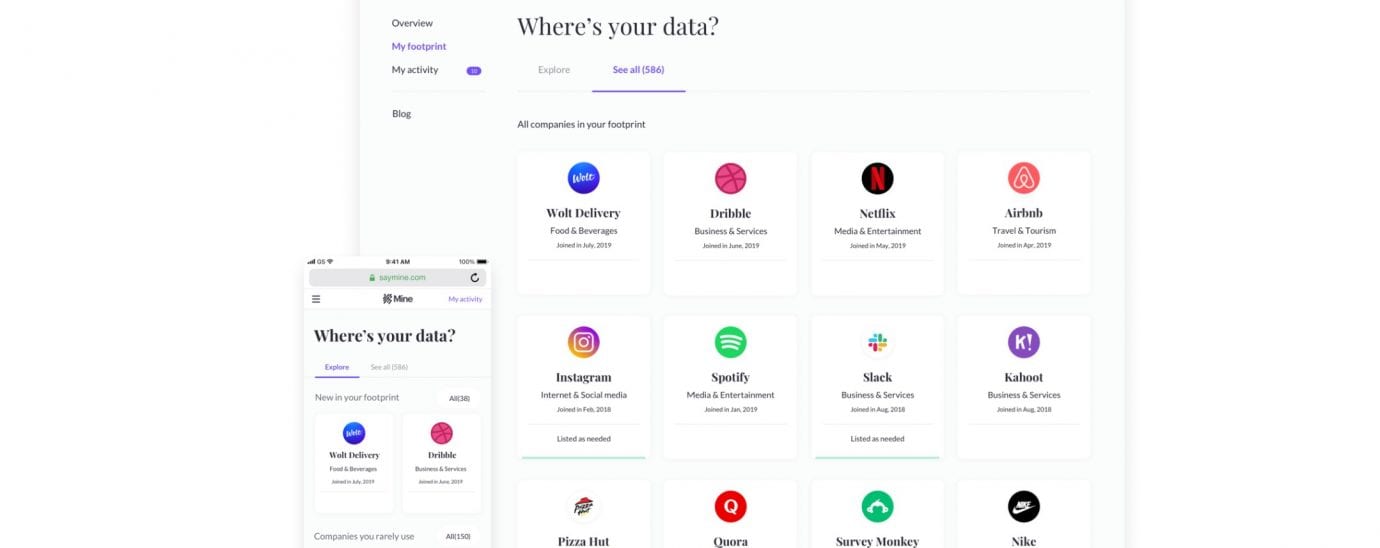Mine raises $9.5m led by gradient ventures and launches smart data assistant for all Americans

The company, on a mission to give data ownership back to users, has already helped over 100K people take control of their personal data to minimize online risks.
Mine, the company enabling consumers to reclaim their personal data and reduce personal data privacy risks today launched its product to all U.S. consumers and announced a $9.5 million Series A round led by Gradient Ventures, Google’s AI-focused venture fund, with participation from e.ventures, MassMutual Ventures, and existing investors Battery Ventures and Saban Ventures. The round, raised entirely remotely in the ongoing COVID-19 pandemic, will allow Mine to build out new products enabling consumers worldwide to fully control how their personal data is used and allow businesses to automatically process “Right-To-Be-Forgotten” requests. Following a successful European launch earlier this year, Mine has facilitated more than one million data reclamation requests in 2020 alone.
With the growth of social networks and personal data collection worldwide, privacy has become a concern for many, with 87% of Americans now viewing data privacy rights as a human right. Despite this concern, on average, 350 companies hold a given consumer’s personal data such as their identity and financial information. These digital traces pose significant identity theft risks for consumers and are abused daily by hackers and nefarious organizations. Mine exists to empower consumers to discover and manage their data by giving the tools to request the removal of their personal data automatically from any company allowing transparency and choice online.
With lawmakers enacting GDPR in Europe and CCPA in California, technologies and consumers have been unable to keep up with the intricacies and details of these complicated laws. Mine provides an easy-to-use platform, powered by AI, to allow the average consumer to manage their personal data across the internet without needing to change their online behavior.
“Data privacy is without a doubt a mainstream concern, but most people don’t know how to control who holds their personal data. We want to change this by making privacy regulations accessible and easy for everyone, so consumers can set their own terms and draw the line on what data they are willing to share” said Gal Ringel, Co-founder, and CEO of Mine. “By streamlining the “Right-To-Be-Forgotten” processes we are bridging the gap between consumers and companies which will shape a new future of data ownership.
How does Mine work?
- Mine identifies companies using email history
- Mine’s proprietary non-intrusive AI algorithm identifies companies that are most likely to have collected the user’s personal data, based on the subject lines in their inbox without reading or collecting the body of the emails. Mine is able to identify dozens of different types of data interactions across 10 different languages.
- Proprietary AI cross-checks privacy policies
- To identify the type of data that was collected, Mine’s AI then analyzes the companies’ privacy policies to determine the data that they collected about customers and whether they are currently selling or sharing it with third parties.
- Mine maps out data spread and provides steps to minimize risk
- Mine calculates an individual risk score for every user and provides recommendations on how to improve their digital footprint. With Mine, consumers on average reduce their digital footprint by 40%.
To date, over 100,000 users have already used Mine to reduce their digital footprint by sending over 1,300,000 data-reclaim requests to more than 150,000 companies. This includes over 15,000 “Epic Save” cases where users deleted their personal info and narrowly avoided a data breach right before it occurred.
“We’re very excited to partner with the team at Mine to give consumers visibility and choice over their personal online data,” said Darian Shirazi, General Partner at Gradient Ventures. “Mine allows the average consumer to access and control over their personal data, and as a result, allows companies to maintain a higher standard when it comes to responsible data collection and security. Many companies promise users they can trust their standards and Mine is the consumer check on that anticipated balance between custodians and providers of data.”
“Data privacy and transparency are top priorities and concerns for consumers in Germany and the broader European Union,” said Christian Miele, Partner at e.ventures. “This is why we truly believe that the future of privacy is giving consumers more control over their personal data online. e.ventures is proud to partner with Mine to fuel data ownership to millions of people worldwide and make their digital life safer.”
“Data privacy is a growing concern for both consumers and businesses,” said Mark Goodman, Managing Director, MassMutual Ventures. “With its technical sophistication and ease of use, Mine is quickly becoming the leading solution in this space, and MassMutual Ventures is excited to join its world-class team. We look forward to providing Mine with guidance and access to MassMutual’s in-house expertise around data governance and protection.”
In addition to the Series A and launch, David Hoffman, Chief Privacy Officer at Intel, and a renowned global privacy guru joins Mine’s Advisory Board to strengthen the company’s strategy and position in the market.
For more information, please visit www.saymine.com.
